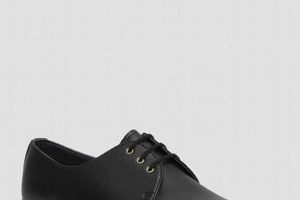Items formulated without animal-derived ingredients represent a growing segment within the personal care industry. This category encompasses shampoos, conditioners, styling aids, and treatments. Examples include products using plant-based oils and extracts instead of lanolin or beeswax.
The increasing demand for these formulations reflects ethical considerations, environmental awareness, and potential health advantages. Historically, ingredients sourced from animals were commonplace; however, contemporary consumers are increasingly seeking alternatives perceived as more sustainable and cruelty-free. This shift emphasizes responsibility and aligns with broader lifestyle choices.
The subsequent sections will explore the specific ingredients commonly utilized in these formulations, discuss their efficacy and performance, and examine the implications for manufacturers and consumers alike.
Guidelines for Selecting Plant-Based Hair Care
Careful selection enhances the benefits derived from plant-based hair care formulations. These guidelines provide a framework for informed purchasing decisions.
Tip 1: Ingredient List Examination: Scrutinize the ingredient list. Look for certifications from recognized certifying bodies to ensure absence of animal-derived components. Common animal ingredients to avoid include keratin, lanolin, beeswax, and collagen.
Tip 2: Understanding Plant-Based Alternatives: Familiarize yourself with plant-based substitutes. Shea butter, coconut oil, argan oil, and various botanical extracts offer moisturizing and conditioning properties similar to their animal-derived counterparts.
Tip 3: Hair Type Considerations: Choose products tailored to specific hair types. Fine hair benefits from lightweight formulas, while thicker hair may require richer, more emollient products. Pay close attention to product descriptions and intended uses.
Tip 4: Patch Testing New Products: Before applying a new product extensively, perform a patch test on a small area of skin. This helps identify potential allergic reactions or sensitivities to specific ingredients.
Tip 5: Avoiding Harsh Chemicals: Opt for formulations that are free from sulfates, parabens, and artificial colors. These harsh chemicals can strip the hair of its natural oils, leading to dryness and damage.
Tip 6: Considering Packaging: Evaluate the environmental impact of packaging. Prioritize products with recyclable or biodegradable packaging to minimize waste.
Tip 7: Researching Brands: Investigate the brand’s ethical standards and commitment to sustainability. Look for companies that prioritize transparency and responsible sourcing of ingredients.
Adherence to these guidelines ensures consumers make well-informed choices, maximizing benefits while aligning with ethical and environmental values.
The following section will address frequently asked questions regarding the efficacy and suitability of plant-based hair care formulations.
1. Cruelty-Free Certification
Cruelty-Free Certification serves as a crucial indicator for consumers seeking assurance that formulations align with ethical standards regarding animal welfare. This certification, when associated with items intended for hair care, directly relates to the plant-based composition, signifying a commitment that extends beyond ingredient selection.
- Independent Auditing
Cruelty-Free certification typically involves independent auditing by third-party organizations. These audits verify that neither the finished product nor its individual ingredients have undergone testing on animals at any stage of development. Certification logos on packaging provide easily recognizable confirmation of this verification process.
- Supplier Scrutiny
The certification process extends beyond the final product formulation to encompass the entire supply chain. Manufacturers must demonstrate that their ingredient suppliers adhere to cruelty-free practices. This necessitates comprehensive documentation and transparency regarding ingredient sourcing and testing protocols.
- Animal Testing Alternatives
Companies pursuing Cruelty-Free certification actively invest in and utilize alternative testing methods. These alternatives include in-vitro testing (using cell cultures) and computer modeling, which provide valuable data without requiring animal experimentation. Adoption of these methods demonstrates a commitment to scientific advancement and ethical responsibility.
- Geographic Considerations
Cruelty-Free certification gains particular significance in regions where animal testing is mandated by law for cosmetics and personal care products. Certification can assure consumers that the brand avoids these markets or utilizes alternative manufacturing and distribution strategies to circumvent animal testing requirements.
Therefore, the presence of Cruelty-Free certification on formulations marketed as plant-based not only confirms the absence of animal-derived ingredients but also validates the brands dedication to ethical production practices throughout its entire operation. This provides discerning consumers with confidence in their purchasing decisions.
2. Plant-Derived Ingredients
Plant-derived ingredients form the foundation of formulations aligned with ideals emphasizing ethical and sustainable sourcing. The utilization of botanical extracts, oils, and proteins is a direct consequence of excluding animal-derived substances. These components provide the functional properties necessary for effective cleansing, conditioning, and styling. For instance, coconut oil replaces lanolin as a moisturizer, while aloe vera substitutes for collagen in enhancing elasticity. The suitability and effectiveness of the final product are intrinsically linked to the quality and processing of these botanical alternatives.
The importance of these materials extends beyond simply fulfilling functional roles; they also address a growing demand for transparency in the ingredient supply chain. Consumers are increasingly scrutinizing the origin and ethical implications of each component, favoring brands that demonstrate responsible sourcing practices. Examples include formulations containing sustainably harvested shea butter from fair trade cooperatives or products utilizing upcycled fruit extracts, thereby minimizing waste and promoting resource efficiency. The adoption of such practices demonstrates a commitment to environmental and social responsibility.
In summary, plant-derived materials are not merely substitutes; they represent a proactive shift toward sustainable practices within the cosmetics industry. While the selection of appropriate materials presents formulation challenges, the outcome aligns with both consumer demand and environmental imperatives. The long-term viability of this sector depends on continued innovation in plant-based material science and responsible sourcing strategies.
3. Sulfate and Paraben Free
The absence of sulfates and parabens is frequently associated with formulations designed to exclude animal-derived components. While not inherently linked, the avoidance of these synthetic chemicals often aligns with the broader philosophy underpinning the selection of plant-based alternatives. Sulfates, known for their detergent properties, can strip the hair of natural oils, leading to dryness and irritation, issues that are often exacerbated in individuals with sensitive skin or scalps. Parabens, employed as preservatives, have raised concerns regarding potential endocrine disruption. For these reasons, “Sulfate and Paraben Free” formulations can provide a gentler option.
Many brands committed to excluding animal-derived substances extend their ethical stance to encompass the avoidance of harsh synthetic chemicals. This is observed in formulations incorporating gentler, plant-derived surfactants, such as coco-glucoside, to cleanse the hair without the harshness associated with sulfates. Natural preservatives, like rosemary extract or vitamin E, are frequently employed in lieu of parabens. A direct example is a formulation containing plant-based keratin and coconut oil, and advertising that it does not contain sulfates or parabens; consumers benefit from a product that both avoids animal ingredients and minimizes potential chemical irritation.
The convergence of these considerations leads to a product that is perceived as more holistic, catering to individuals prioritizing not only animal welfare but also overall health and environmental sustainability. However, it is crucial to note that “Sulfate and Paraben Free” claims do not automatically guarantee the absence of animal-derived ingredients. Careful examination of the ingredient list remains paramount for individuals seeking formulations that exclusively utilize plant-based components.
4. Environmental Sustainability
The relationship between environmental sustainability and formulations designed without animal-derived ingredients is multifaceted, encompassing ingredient sourcing, manufacturing processes, packaging, and waste disposal. The increasing demand for such products stems, in part, from a growing awareness of the environmental impact associated with animal agriculture, including deforestation, greenhouse gas emissions, and water consumption. By utilizing plant-based alternatives, manufacturers can reduce their reliance on resource-intensive practices associated with animal-derived ingredients. For instance, the replacement of lanolin, derived from sheep’s wool, with plant-based oils reduces the environmental footprint associated with wool production. A direct effect is the decreased consumption of land and water resources.
Furthermore, a commitment to environmental sustainability often extends to other aspects of product development. Many brands prioritize the use of sustainably sourced ingredients, ensuring that raw materials are harvested without causing deforestation, habitat destruction, or soil degradation. Examples include using certified organic ingredients, supporting fair trade practices, and implementing water conservation measures in manufacturing facilities. Packaging choices also reflect environmental considerations, with many companies opting for recyclable, biodegradable, or compostable materials to minimize waste and reduce reliance on fossil fuels. This integrated approach demonstrates a holistic understanding of environmental responsibility.
In conclusion, the connection between formulations lacking animal-derived ingredients and environmental sustainability is significant. It addresses ethical concerns associated with animal welfare while also mitigating the environmental impact of the cosmetics industry. The transition to plant-based ingredients, coupled with sustainable sourcing and responsible packaging, represents a proactive step towards minimizing the industry’s ecological footprint. However, continuous improvement and innovation are essential to address ongoing challenges and ensure the long-term viability of this approach.
5. Hair Type Specificity
Hair type specificity in relation to formulations free of animal products dictates the careful selection of ingredients and product attributes to effectively address the unique characteristics and requirements of diverse hair textures and conditions. The efficacy of any regimen, regardless of its ethical positioning, hinges on its ability to cater to the individual’s specific needs.
- Ingredient Selection for Fine Hair
Fine hair often requires lightweight formulations to avoid weighing the hair down and creating a limp appearance. Plant-based ingredients such as aloe vera, green tea extract, and rice protein are often incorporated due to their ability to provide volume and strength without adding excessive weight. The absence of heavy oils and butters is crucial to maintain hair’s natural movement.
- Ingredient Selection for Thick Hair
Thick hair frequently benefits from richer, more emollient plant-based ingredients to provide sufficient moisture and manageability. Shea butter, coconut oil, and avocado oil are commonly employed to deeply hydrate the hair shaft, reduce frizz, and improve overall texture. Such formulations prioritize hydration and smoothing properties.
- Addressing Curly and Coily Hair Needs
Curly and coily hair textures are particularly prone to dryness and breakage due to the shape of the hair shaft, which hinders the distribution of natural oils. Plant-based oils, such as jojoba and grapeseed, are utilized to mimic the scalp’s natural sebum and provide enhanced lubrication. Emollient ingredients, such as flaxseed gel, are added for curl definition and hold, without the stiffness often associated with synthetic styling agents.
- Scalp Condition Considerations
Formulations targeted towards specific scalp conditions, such as dryness, oiliness, or sensitivity, require careful ingredient selection. Plant-based ingredients with soothing and anti-inflammatory properties, such as chamomile and calendula, are incorporated into regimens designed for sensitive scalps. For oily scalps, ingredients like tea tree oil and rosemary extract are employed to regulate sebum production without stripping the scalp of essential moisture. These considerations ensure comprehensive regimen suitability.
Ultimately, the successful integration of formulations excluding animal-derived substances into a user’s regimen necessitates a detailed understanding of hair type and condition. The thoughtful selection of plant-based ingredients, tailored to specific hair needs, enhances the potential for optimal results and overall hair health. Therefore, consumers should prioritize products that clearly indicate their suitability for specific hair types to maximize benefits.
6. Scalp Health Focus
The health of the scalp is intrinsically linked to the overall condition and appearance of hair. Plant-based formulations, marketed as a means of excluding animal-derived ingredients, also frequently address the importance of a balanced and nourished scalp environment. The selection of ingredients directly influences scalp health, impacting factors such as inflammation, hydration, and sebum production.
- Gentle Cleansing Agents
Conventional shampoos often contain harsh sulfates that, while effectively removing dirt and oil, can strip the scalp of its natural oils, leading to dryness, irritation, and imbalance. Plant-based formulations frequently incorporate milder surfactants, such as coco-glucoside and decyl glucoside, which cleanse effectively without disrupting the scalp’s natural barrier function. For example, a product containing rosemary extract and aloe vera, claiming to be gentle, does not irritate sensitive skin.
- Anti-Inflammatory Botanicals
Inflammation is a common scalp concern, manifesting as itchiness, redness, and dandruff. Many plant-derived ingredients possess anti-inflammatory properties that can soothe and calm an irritated scalp. Ingredients such as chamomile, calendula, and aloe vera have demonstrated efficacy in reducing inflammation and promoting scalp comfort. The incorporation of these materials aims to alleviate discomfort.
- Hydrating and Emollient Ingredients
Maintaining adequate scalp hydration is crucial for preventing dryness, flakiness, and itchiness. Plant-based formulations often include hydrating ingredients such as hyaluronic acid and glycerin, which attract and retain moisture in the scalp. Emollient ingredients, such as shea butter and coconut oil, further enhance hydration by creating a protective barrier that prevents moisture loss. They prevent the creation of a harsh environment.
- Sebum-Regulating Extracts
An imbalance in sebum production can lead to either an excessively oily or dry scalp. Plant-derived ingredients such as tea tree oil, rosemary extract, and peppermint oil possess sebum-regulating properties that can help restore balance. These materials are often incorporated into formulations designed for oily or combination hair types to control oil production without over-drying the scalp.
The focus on scalp health within plant-based formulations represents a holistic approach to regimen selection. By prioritizing gentle cleansing, anti-inflammatory botanicals, hydrating ingredients, and sebum-regulating extracts, these products aim to create an optimal scalp environment that promotes healthy hair growth and overall well-being. The efficacy and consumer satisfaction with any option, ultimately, depends on ingredient quality.
7. Performance and Efficacy
The ultimate measure of any formulation, regardless of its composition, lies in its ability to deliver tangible results that meet consumer expectations. For items specifically designed to exclude animal-derived components, performance and efficacy are critical factors in driving market acceptance and demonstrating the viability of plant-based alternatives.
- Cleansing Effectiveness
Effective cleansing is a fundamental requirement. Plant-based surfactants must adequately remove dirt, oil, and product buildup without causing excessive dryness or irritation. The efficacy of these surfactants is evaluated through controlled studies comparing their cleansing power to that of traditional sulfate-based cleansers. Successful items effectively clean the scalp without stripping essential moisture. Examples include formulations utilizing coco-glucoside or decyl glucoside.
- Conditioning and Manageability
Conditioning agents enhance manageability, reduce frizz, and improve the overall texture of hair. Plant-derived oils, butters, and proteins are employed to provide hydration, lubrication, and strength. The effectiveness of these ingredients is assessed through instrumental measurements of hair tensile strength, elasticity, and smoothness. A quantifiable improvement in these parameters demonstrates the efficacy of plant-based conditioning agents. An example is a shea butter-based conditioner improving the elasticity of dry hair.
- Styling and Hold
Styling products must provide adequate hold, volume, and definition without compromising the health or appearance of the hair. Plant-based styling agents, such as plant-derived gums and resins, are used to create desired styles. The performance of these agents is evaluated based on their ability to maintain the style over time, resist humidity, and avoid flaking or stiffness. Formulations containing aloe vera for hold and shine demonstrate this attribute. A clear, long-lasting hold demonstrates styling efficacy.
- Long-Term Hair Health
Long-term hair health is a critical consideration. Plant-based formulations must contribute to the overall health and vitality of hair over time, preventing damage, promoting growth, and maintaining a balanced scalp environment. The efficacy of these products is assessed through longitudinal studies monitoring hair breakage, growth rate, and scalp condition. Visible improvements in these parameters confirm the long-term benefits. Improved hair thickness and reduced breakage indicate positive outcomes.
Therefore, the performance and efficacy of items created without animal-derived components are essential for establishing credibility and driving market adoption. Through rigorous testing and careful ingredient selection, manufacturers can demonstrate that plant-based alternatives offer comparable, or even superior, results compared to traditional formulations. The focus on delivering tangible benefits remains paramount for sustained success in this evolving market segment. The long-term impact of these choices further reinforces the importance of sustained efficacy.
Frequently Asked Questions Regarding Vegan Hair Products
The subsequent section addresses common inquiries concerning formulations lacking animal-derived ingredients. The information presented aims to provide clarity and dispel misconceptions surrounding this product category.
Question 1: Are vegan hair products inherently superior to non-vegan alternatives?
The absence of animal-derived ingredients does not automatically guarantee superior quality or performance. Efficacy depends on the specific formulation, ingredient quality, and suitability for individual hair types. Claims of superiority should be substantiated by scientific evidence and user reviews.
Question 2: Do vegan hair products effectively address all hair types and concerns?
The effectiveness of any formulation depends on its specific composition and targeted function. Vegan options are available for a wide range of hair types and concerns, including dryness, damage, oiliness, and color-treated hair. Careful product selection is crucial to ensure compatibility with individual needs.
Question 3: Are all products labeled “natural” or “organic” also vegan?
The terms “natural” and “organic” do not necessarily indicate the absence of animal-derived ingredients. Some natural and organic formulations may contain substances such as beeswax, honey, or lanolin. Thorough inspection of the ingredient list is essential to confirm suitability.
Question 4: Are vegan hair products more expensive than conventional options?
The price of formulations lacking animal-derived ingredients varies depending on brand, ingredient quality, and manufacturing processes. Some are priced similarly to conventional options, while others may command a premium due to specialized ingredients or sourcing practices. Price is not always an indicator of quality or performance.
Question 5: Can vegan hair products effectively treat severe scalp conditions?
The suitability of formulations lacking animal-derived ingredients for treating severe scalp conditions depends on the specific ingredients and the nature of the condition. Individuals with conditions such as eczema, psoriasis, or severe dandruff should consult a dermatologist to determine the most appropriate course of treatment.
Question 6: Do vegan hair products require special storage or handling?
Storage and handling requirements for these items generally align with those of conventional formulations. Adherence to the manufacturer’s instructions regarding storage temperature and shelf life is essential to maintain product integrity and efficacy. Some products containing natural preservatives may have shorter shelf lives.
In summary, formulations lacking animal-derived ingredients represent a viable alternative for consumers seeking ethical and potentially more sustainable personal care options. Careful evaluation of ingredients, product claims, and individual needs is crucial to ensure optimal results.
The following section will explore the economic and market trends shaping the proliferation of formulations lacking animal-derived ingredients.
Conclusion
This exploration has illuminated the multifaceted nature of items formulated without animal-derived components. The discussion encompassed ethical considerations, ingredient selection, performance expectations, and consumer understanding. Key points include the importance of independent certification, the functionality of plant-based alternatives, and the necessity of tailoring product selection to individual hair types and concerns. The absence of animal-derived ingredients represents a tangible shift toward responsible consumption, demanding a nuanced comprehension of both the benefits and limitations inherent in these formulations.
Continued vigilance regarding ingredient sourcing, coupled with ongoing research into plant-based material science, will be critical for the sustained growth and integrity of the plant-based segment. The decisions made by both manufacturers and consumers will ultimately determine the long-term impact of this evolving trend. The proliferation of verifiable and efficacious items represents a significant opportunity to promote both environmental stewardship and consumer well-being.







